 Author: Lisa Huang, Progressive Legal
Author: Lisa Huang, Progressive Legal

Execution of Deeds: Types, Requirements and Key Considerations

In Australia, deeds are fundamental legal documents that bind parties to specific obligations.
Unlike simple contracts, deeds do not require consideration to be enforceable, but they must meet rigorous execution standards, governed by both the Corporations Act and various state or territory legislations.
What is a Deed?
A deed is a formal written document that signifies a binding commitment or promise by the signing party to perform a specified action.
Typical types of deeds include:
Deed of Assignment
A deed of assignment transfers legal rights, like intellectual property or contractual rights, to another party.
Deed of Termination
This type of deed ends a prior contract or business relationship.
Deed of Confidentiality
A deed of confidentiality commits a party to keep certain business information confidential.
Deed of Variation
This deed alters clauses in an existing agreement, such as leases or shareholder agreements.
Executing a deed involves signing and completing it to make it legally effective and enforceable, which is crucial to avoid potential legal issues later on.
Execution Requirements
Deeds must be in written form and were historically authenticated by a wax seal. Today, this requirement is satisfied by the phrase “signed, sealed, and delivered” within the execution block, which serves the same purpose.
Delivery of the deed traditionally involved a physical handover, but now it is presumed to be delivered once properly executed, establishing its effectiveness from that point.
Below is a brief summary of the current regulations on electronic execution of deeds in each State and Territory. Given the ongoing changes, it is important to verify that electronic execution is acceptable at the time it is needed.
Queensland and Victoria
In these states, deeds can be executed electronically without a witness. Although there are provisions for witnessing through electronic means (e.g., audiovisual link), this is optional for valid execution.
New South Wales
Electronic execution of deeds is permitted, but they must be witnessed. The witnessing process can be done electronically, with the witness required to add a statement that specifies the witnessing method and confirms compliance with section 14G of the Electronic Transactions Act 2000 (NSW).
Australian Capital Territory
There are temporary provisions that permit the electronic execution of specific documents, such as wills and powers of attorney, with required witnessing via audiovisual link. These provisions are temporary and should be evaluated on an individual basis.
Other Jurisdictions (South Australia, Western Australia, Tasmania, Northern Territory)
These regions do not support the electronic execution of deeds, generally necessitating a physical witness or a traditional ‘wet ink’ signature.
Execution by Entity Types
Individuals executing deeds need to sign their names, often in the presence of a third-party witness, to confirm the execution’s authenticity. This witness should be an adult of sound mind and not a party to the deed.
An individual execution example:
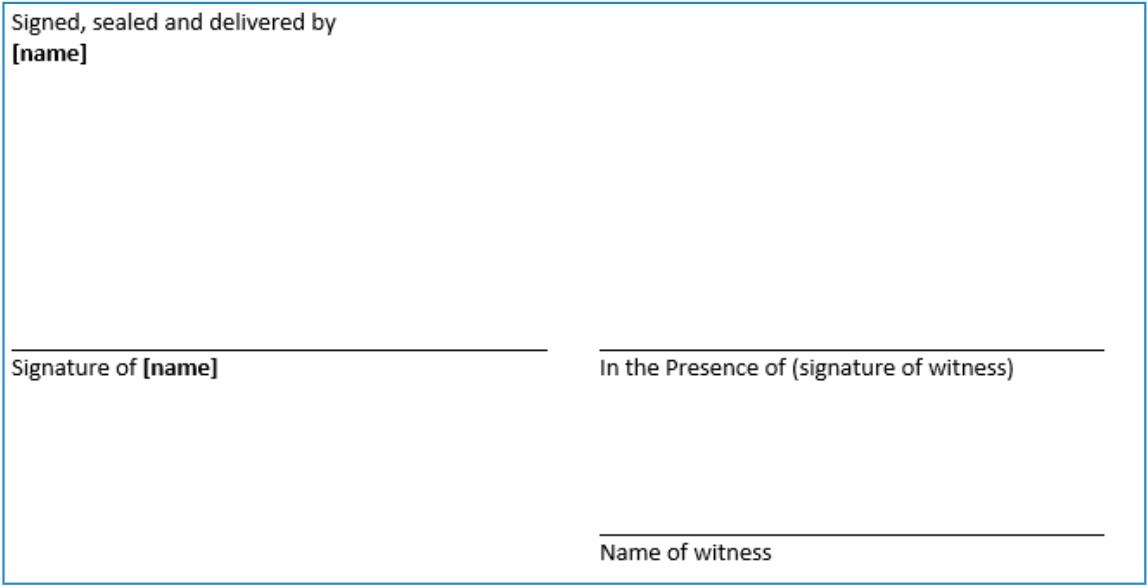
For partnerships, execution can occur either by a single partner with explicit authority granted through a separate legal instrument, such as a power of attorney, or by all partners collectively.
The authority for a partner to sign on behalf of the partnership needs to be clearly established to avoid disputes regarding the deed’s enforceability.
A partnership execution example:
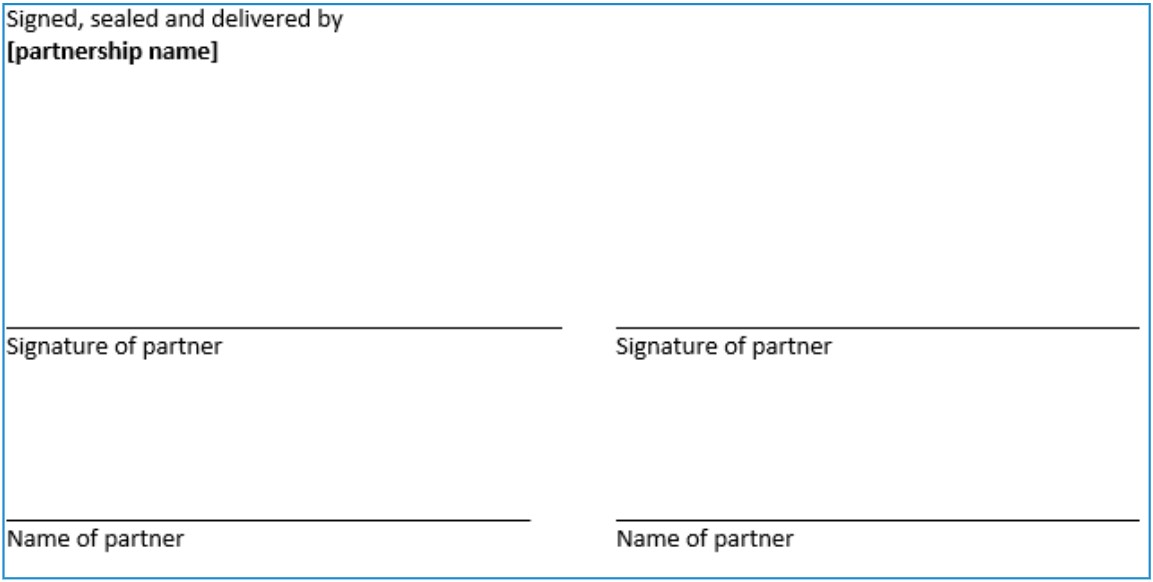
Section 127 of the Corporations Act sets out the rules for executing documents for companies, which outlines that a company can execute a deed if signed by two directors, one director and one company secretary, or in the case of proprietary companies, by a sole director who is also the company secretary.
Alternatively, the use of a company’s common seal, witnessed by these same officers, remains a valid method of execution.
A company execution example:
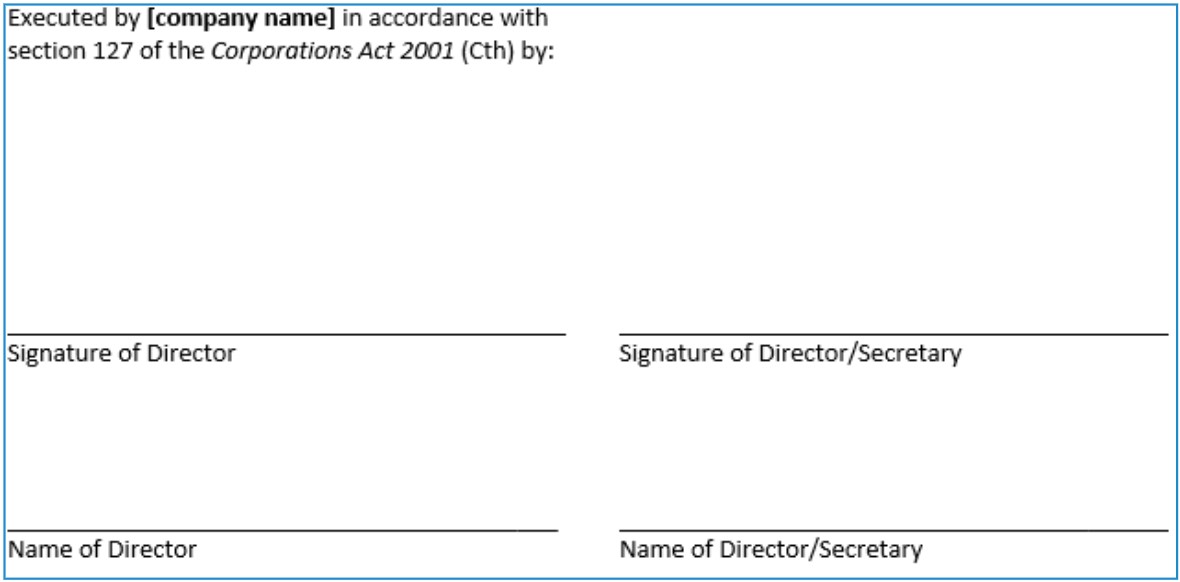
Trustees, whether individual or corporate, must also execute deeds correctly, indicating their capacity as trustee. This ensures that the deed is executed with proper authority, particularly when the trustee acts on behalf of a trust.
An individual trustee execution example:
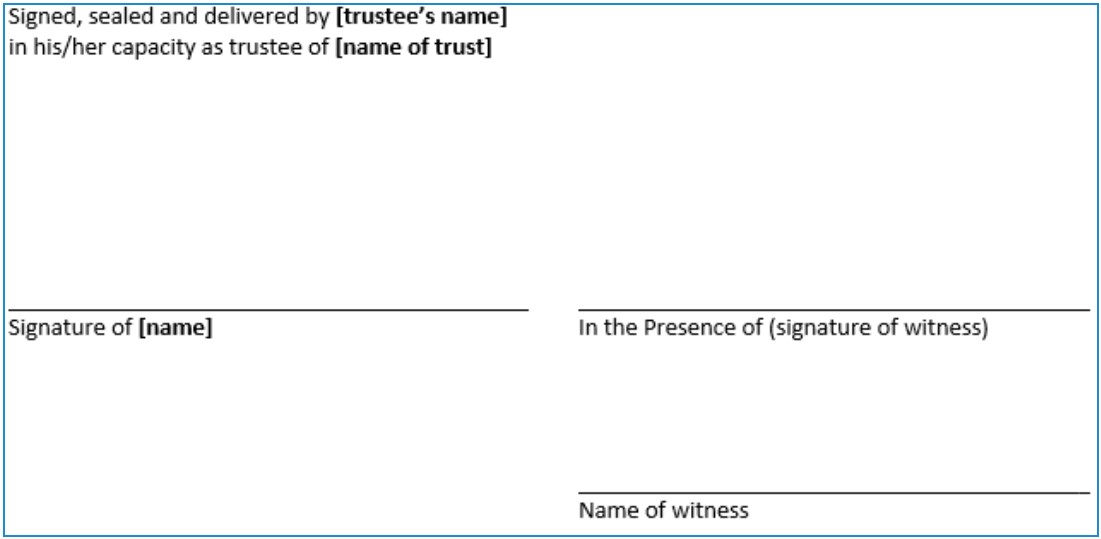
A corporation trustee execution example:
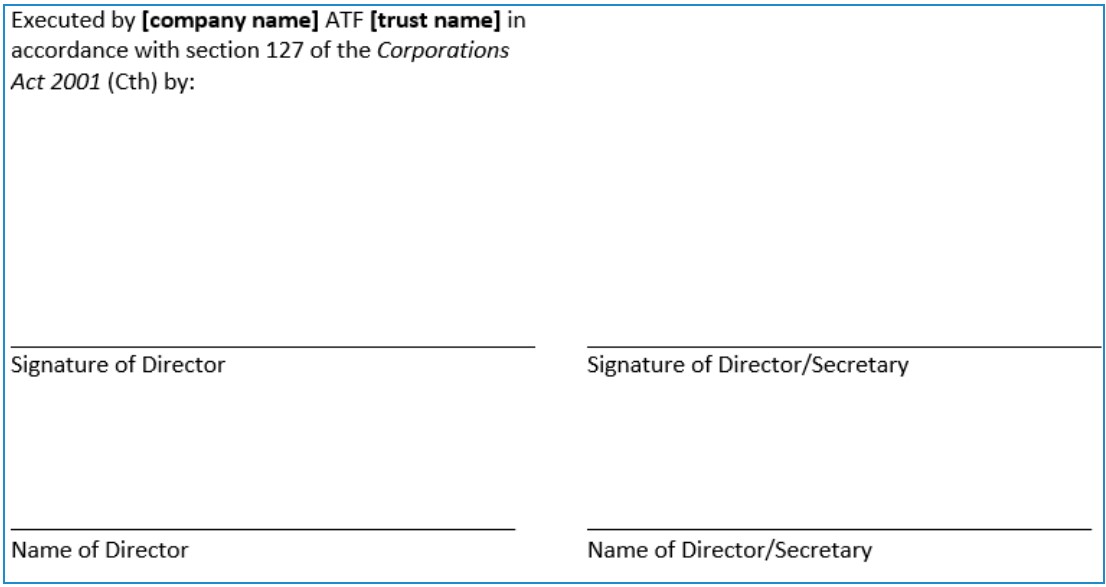
Key Takeaways
1. Avoid executing deeds electronically, despite recent legal allowances for electronic execution in some regions.
2. Make sure the deed complies with the requirements specific to the entity executing it. For example, include phrases such as ‘executed as a deed’ and ‘signed, sealed, and delivered’ for individuals.
3. Ensure especially under the Corporations Act, companies have the correct individuals execute the deed.
4. Always print the entire document from a PDF, not just the signature pages.
5. Do not pre-sign the signature pages, the entire deed should be printed out, the pages securely fastened together, and only then should the deed be fully executed.
6. Date the deed at the time of signing.
7. Retain the original copy of the deed, keeping a copy of the deed for each party.
To ensure the enforceability of a deed, it is important to understand the capacity in which individuals are signing, whether as an individual, company, trustee, or witness. Ensuring that deeds are meticulously drafted with clear and precise execution clauses and having them drafted by legal professionals before execution can prevent issues down the track.
Deeds are binding legal documents that outline a party’s commitment to act, and their effectiveness can be compromised if not executed correctly. For guidance, contact our specialist team of dispute lawyers at Progressive Legal on 1800 820 083 or by requesting our advice below.
Need a deed executed?
Contact us by giving us a call on 1800 820 083 or request our advice below.
REQUEST OUR ADVICENeed Dispute Resolution Advice?
Please get in touch with us today via phone or the contact form on this page.


